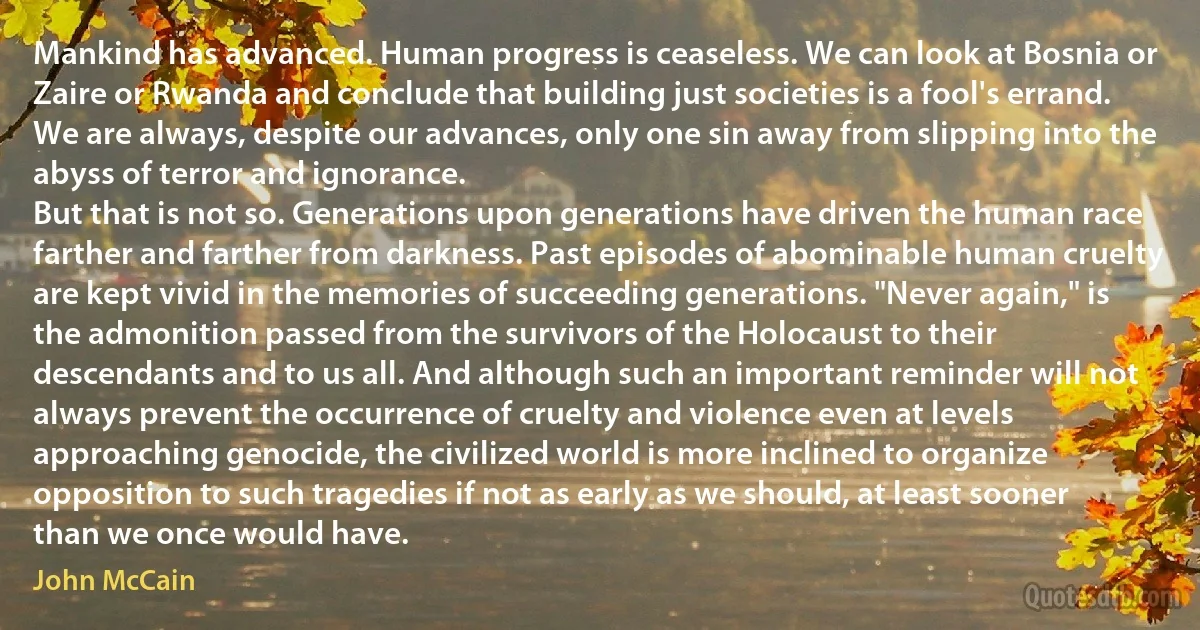
Mankind has advanced. Human progress is ceaseless. We can look at Bosnia or Zaire or Rwanda and conclude that building just societies is a fool's errand. We are always, despite our advances, only one sin away from slipping into the abyss of terror and ignorance. But that is not so. Generations upon generations have driven the human race farther and farther from darkness. Past episodes of abominable human cruelty are kept vivid in the memories of succeeding generations. "Never again," is the admonition passed from the survivors of the Holocaust to their descendants and to us all. And although such an important reminder will not always prevent the occurrence of cruelty and violence even at levels approaching genocide, the civilized world is more inclined to organize opposition to such tragedies if not as early as we should, at least sooner than we once would have.
John McCainRelated topics
building darkness drive early holocaust human ignorance least once past race reminder should sin vivid world sooner genocide bosniaRelated quotes
of the body was immediately agitated with convulsive movements resembling a violent shuddering from cold. ... On moving the second rod from hip to heel, the knee being previously bent, the leg was thrown out with such violence as nearly to overturn one of the assistants, who in vain tried to prevent its extension. The body was also made to perform the movements of breathing by stimulating the phrenic nerve and the diaphragm. When the supraorbital nerve was excited 'every muscle in his countenance was simultaneously thrown into fearful action; rage, horror, despair, anguish, and ghastly smiles, united their hideous expressions in the murderer's face, surpassing far the wildest representations of Fuseli or a Kean. At this period several of the spectators were forced to leave the apartment from terror or sickness, and one gentleman fainted.

Andrew Ure
This tribune was the terror of every tyranny and fanaticism, it was the hope of every one who was oppressed under Heaven. Whoever placed his foot upon that height, felt distinctly the pulsations of the great heart of mankind. There, providing he was a man of earnest purpose, his soul swelled within him, and shone without. A breath of universal philanthropy seized him, and filled his mind as the breeze fills the sail; so long as his feet rested upon those four planks, he was a stronger and a better man; he felt at that consecrated minute as if he were living the life of all the nations; words of charity for all men came to his lips; beyond the Assembly, grouped at his feet, and frequently in a tumult, he beheld the people, attentive, serious, with ears strained, and fingers on lips; and beyond the people, the human race, plunged in thought, seated in circles, and listening.

Victor Hugo
What becomes of human free will and agency? ...it seems to me to involve one of the most admirable laws of conservation in nature-a law which presents a new proof of the wisdom of the Creator... It is necessary, then, to admit that free-will exercises itself within indefinite limits, if one wishes not to incur the reproach of denying it altogether. But, with all the follies which have passed through the head of man, with all the perverse inclinations which have desolated society, what would have become of our race during so many past ages? All these scourges have passed by, and neither man nor his faculties have undergone sensible alterations, as far at least as our observations can determine. This is because the same finger which has fixed limits to the sea, has set similar bounds to the passions of men-because the same voice has said to both, "Hitherto shalt thou come, and no farther!"

Adolphe Quetelet
He remembered how the night dew had fallen upon him,-how the dark forest had whispered to him,-how the stars had gleamed upon him,-a simple and loving man, watching his fire in the years gone by, and ever musing as it burned. He remembered with what tenderness, with what love and sympathy for mankind, and what pity for human guilt and woe, he had first begun to contemplate those ideas which afterwards became the inspiration of his life; with what reverence he had then looked into the heart of man, viewing it as a temple originally divine, and, however desecrated, still to be held as sacred to a brother; with what awful fear he had deprecated the success of his pursuit, and prayed that the Unpardonable Sin might never be revealed to him. Then ensued the base intellectual development which, in its progress, disturbed the counterpoise between his mind and heart.

Nathaniel Hawthorne
Christ's resurrection is not an event of the past; it contains a vital power which has permeated this world. Where all seems to be dead, signs of the resurrection suddenly spring up. It is an irresistible force. Often it seems that God does not exist: all around us we see persistent injustice, evil, indifference and cruelty. But it is also true that in the midst of darkness something new always springs to life and sooner or later produces fruit. On razed land life breaks through, stubbornly yet invincibly. However dark things are, goodness always re-emerges and spreads. Each day in our world beauty is born anew, it rises transformed through the storms of history. Values always tend to reappear under new guises, and human beings have arisen time after time from situations that seemed doomed. Such is the power of the resurrection, and all who evangelize are instruments of that power.

Pope Francis
